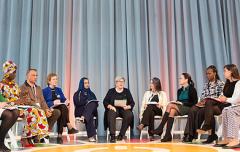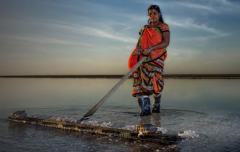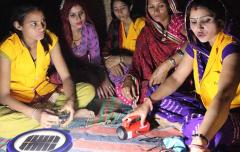Women Energy Entrepreneurs Need Financing to Reach Vulnerable Populations
This blog post is part of a series Sustainable Energy for All (SEforALL) is running throughout March related to our work and partners from the People-Centered Accelerator. The series has been timed to coincide with International Women’s Day on March 8, 2018.
“If energy poverty had a face, it would be of a brown or black woman. And yet, there is a large gap of financing available for women energy entrepreneurs who have faced the problem first-hand. As we celebrate International Women’s Day this month, we must acknowledge that ecosystem support services for women entrepreneurs is critical for achieving energy access objectives under Sustainable Development Goal 7.
Currently, energy access investors have been focused on picking winners – so-called unicorns –that can scale their services to reach millions of customers. However, with 1.06 billion people still lacking access to basic electricity, many of them women living in urban slums and rural areas in Africa and Asia, a combination of unicorns and zebras (typically female-founded businesses that have slower growth, but sustainable returns) is needed to achieve SDG7, which calls for universal access to sustainable energy by 2030.
Regardless of the wealth and advancement of their economies, according to the Mastercard Index of Women Entrepreneurs, countries that have favourable entrepreneurial conditions for Small Medium Enterprises (SMEs) and good governance tend to have more women business owners. The backing of local SME financiers, local intermediaries and providing cheaper debt capital are a few ways to make energy investments more inclusive.
SMEs are the engines that drive an economy’s growth, create jobs, and are conducive for women in the workforce. Furthermore, when women energy entrepreneurs do receive financing, they create innovative approaches to furthering energy access to so-called ‘last mile’ populations, such as tapping into Self Help Groups, Village Loans and Savings Associations, Cooperatives, Community Based Organizations, schools and other institutions.
The lack of access to financing has long been identified as the biggest barrier for achieving SDG7 goals, especially in Least Developed Countries. Much of the capital flowing to renewable energy sectors in these countries is geared towards large-scale, infrastructure projects. Development Finance Institutions (DFIs) are a key stakeholder, filling the gap where the private sector is reluctant to participate.
Gender disparities, however, remain quite clear in terms of access to finance and investment flows. Women-owned businesses in developing countries typically are smaller businesses. Energy businesses popular with women, such as pico solar lantern distribution, retail, and small-scale production in briquettes and cooking stoves, tend to have low revenue and operate with slim margins. They are typically funded by grants rather than investment capital, making it difficult for micro and small businesses to grow. Most Microfinance Institutions have not supported energy entrepreneurs at the scale originally envisioned due to lack of expertise and experience with energy lending.
Tailored incubators and accelerators, such as ENVenture in Uganda, support local energy entrepreneurs by helping to make connections, facilitate introductions, extend networks, and provide mentorship. This type of facility especially supports women energy entrepreneurs in developing countries who typically require more training and financial literacy programs to improve their business growth. The key, however, is to offer both financing and mentorship. Without mentorship, many entrepreneurs become stuck in the difficulties of running a business and may use financing unwisely. Similarly, an entrepreneur who receives mentorship, but has difficulty accessing financing, is a creating a road leading to nowhere. Both are necessary for entrepreneurs to succeed.
Another way that ENVenture is tackling these issues is by partnering with Sustainable Energy for All on its People-Centered Accelerator, a global initiative aimed at advancing gender equality, social inclusion and women’s empowerment in the sustainable energy sector. Unlocking finance and collaborative mentoring are key priorities for the Accelerator, which is especially focused on delivering clean, affordable energy to under-served ‘last-mile’ populations.
Investing in women is not just altruistic; it makes good business sense and will increase access to modern energy. Global investments in women entrepreneurs are already extremely low; investors must not fall into the same pattern when investing in energy access. This is a uniquely gendered market that requires equal participation of women and men for universal energy access goals to truly be achieved.
To find out more about joining the People-Centered Accelerator, or any other partnership opportunity with SEforALL, please email partnerships@SEforALL.org
Read more on the Accelerator here and follow #SDG7AllEqual for the latest.



